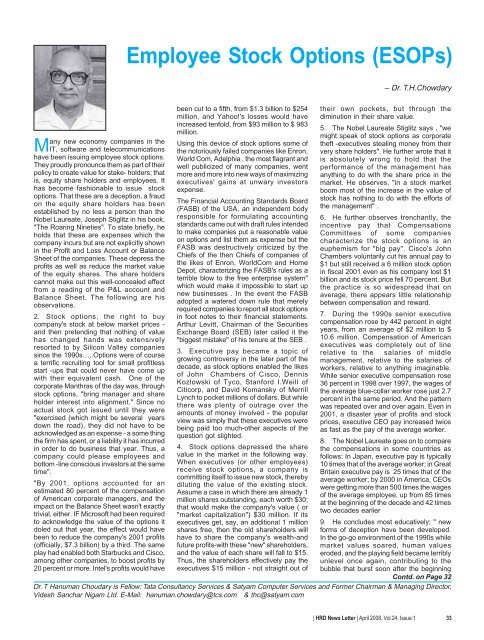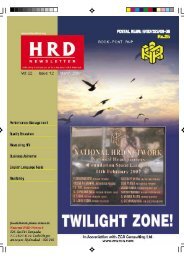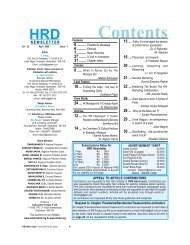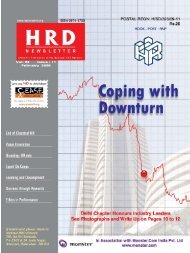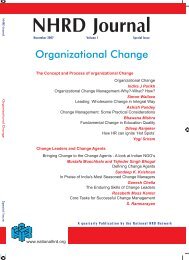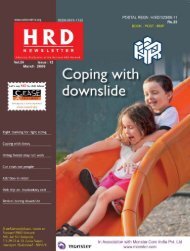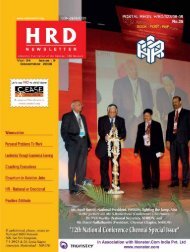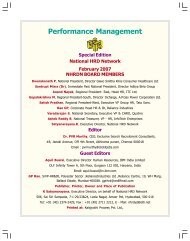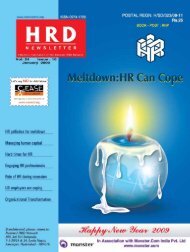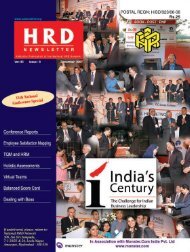5 ........................Chennai Chapter Report 6 ... - National HRD Network
5 ........................Chennai Chapter Report 6 ... - National HRD Network
5 ........................Chennai Chapter Report 6 ... - National HRD Network
You also want an ePaper? Increase the reach of your titles
YUMPU automatically turns print PDFs into web optimized ePapers that Google loves.
Employee Stock Options (ESOPs)<br />
– Dr. T.H.Chowdary<br />
Many new economy companies in the<br />
IT, software and telecommunications<br />
have been issuing employee stock options.<br />
They proudly pronounce them as part of their<br />
policy to create value for stake- holders; that<br />
is, equity share holders and employees. It<br />
has become fashionable to issue stock<br />
options. That these are a deception, a fraud<br />
on the equity share holders has been<br />
established by no less a person than the<br />
Nobel Laureate, Joseph Stiglitz in his book,<br />
"The Roaring Nineties". To state briefly, he<br />
holds that these are expenses which the<br />
company incurs but are not explicitly shown<br />
in the Profit and Loss Account or Balance<br />
Sheet of the companies. These depress the<br />
profits as well as reduce the market value<br />
of the equity shares. The share holders<br />
cannot make out this well-concealed effect<br />
from a reading of the P&L account and<br />
Balance Sheet. The following are his<br />
observations.<br />
2. Stock options, the right to buy<br />
company's stock at below market prices -<br />
and then pretending that nothing of value<br />
has changed hands was extensively<br />
resorted to by Silicon Valley companies<br />
since the 1990s…..Options were of course<br />
a terrific recruiting tool for small profitless<br />
start -ups that could never have come up<br />
with their equivalent cash. One of the<br />
corporate Manthras of the day was, through<br />
stock options, "bring manager and share<br />
holder interest into alignment." Since no<br />
actual stock got issued until they were<br />
"exercised (which might be several years<br />
down the road), they did not have to be<br />
acknowledged as an expense - a some thing<br />
the firm has spent, or a liability it has incurred<br />
in order to do business that year. Thus, a<br />
company could please employees and<br />
bottom -line conscious investors at the same<br />
time".<br />
"By 2001, options accounted for an<br />
estimated 80 percent of the compensation<br />
of American corporate managers, and the<br />
impact on the Balance Sheet wasn't exactly<br />
trivial, either. IF Microsoft had been required<br />
to acknowledge the value of the options it<br />
doled out that year, the effect would have<br />
been to reduce the company's 2001 profits<br />
(officially, $7.3 billion) by a third. The same<br />
play had enabled both Starbucks and Cisco,<br />
among other companies, to boost profits by<br />
20 percent or more. Intel's profits would have<br />
been cut to a fifth, from $1.3 billion to $254<br />
million, and Yahoo!'s losses would have<br />
increased tenfold, from $93 million to $ 983<br />
million.<br />
Using this device of stock options some of<br />
the notoriously failed companies like Enron,<br />
World Com, Adelphia , the most flagrant and<br />
well publicized of many companies, went<br />
more and more into new ways of maximizing<br />
executives' gains at unwary investors<br />
expense.<br />
The Financial Accounting Standards Board<br />
(FASB) of the USA, an independent body<br />
responsible for formulating accounting<br />
standards came out with draft rules intended<br />
to make companies put a reasonable value<br />
on options and list them as expense but the<br />
FASB was destructively criticized by the<br />
Chiefs of the then Chiefs of companies of<br />
the likes of Enron, WorldCom and Home<br />
Depot, characterizing the FASB's rules as a<br />
terrible blow to the free enterprise system"<br />
which would make it impossible to start up<br />
new businesses . In the event the FASB<br />
adopted a watered down rule that merely<br />
required companies to report all stock options<br />
in foot notes to their financial statements.<br />
Arthur Levitt, Chairman of the Securities<br />
Exchange Board (SEB) later called it the<br />
"biggest mistake" of his tenure at the SEB .<br />
3. Executive pay became a topic of<br />
growing controversy in the later part of the<br />
decade, as stock options enabled the likes<br />
of John Chambers of Cisco, Dennis<br />
Kozlowski of Tyco, Stanford I.Weill of<br />
Citicorp, and David Komansky of Merrill<br />
Lynch to pocket millions of dollars. But while<br />
there was plenty of outrage over the<br />
amounts of money involved - the popular<br />
view was simply that these executives were<br />
being paid too much-other aspects of the<br />
question got slighted.<br />
4. Stock options depressed the share<br />
value in the market in the following way.<br />
When executives (or other employees)<br />
receive stock options, a company is<br />
committing itself to issue new stock, thereby<br />
diluting the value of the existing stock.<br />
Assume a case in which there are already 1<br />
million shares outstanding, each worth $30;<br />
that would make the company's value ( or<br />
"market capitalization") $30 million. If its<br />
executives get, say, an additional 1 million<br />
shares free, then the old shareholders will<br />
have to share the company's wealth-and<br />
future profits-with these "new" shareholders,<br />
and the value of each share will fall to $15.<br />
Thus, the shareholders effectively pay the<br />
executives $15 million - not straight out of<br />
their own pockets, but through the<br />
diminution in their share value.<br />
5. The Nobel Laureate Stiglitz says , "we<br />
might speak of stock options as corporate<br />
theft -executives stealing money from their<br />
very share holders". He further wrote that it<br />
is absolutely wrong to hold that the<br />
performance of the management has<br />
anything to do with the share price in the<br />
market. He observes, "in a stock market<br />
boom most of the increase in the value of<br />
stock has nothing to do with the efforts of<br />
the management" .<br />
6. He further observes trenchantly, the<br />
incentive pay that Compensations<br />
Committees of some companies<br />
characterize the stock options is an<br />
euphemism for "big pay". Cisco's John<br />
Chambers voluntarily cut his annual pay to<br />
$1 but still received a 6 million stock option<br />
in fiscal 2001 even as his company lost $1<br />
billion and its stock price fell 70 percent. But<br />
the practice is so widespread that on<br />
average, there appears little relationship<br />
between compensation and reward.<br />
7. During the 1990s senior executive<br />
compensation rose by 442 percent in eight<br />
years, from an average of $2 million to $<br />
10.6 million. Compensation of American<br />
executives was completely out of line<br />
relative to the salaries of middle<br />
management, relative to the salaries of<br />
workers, relative to anything imaginable.<br />
While senior executive compensation rose<br />
36 percent in 1998 over 1997, the wages of<br />
the average blue-collar worker rose just 2.7<br />
percent in the same period. And the pattern<br />
was repeated over and over again. Even in<br />
2001, a disaster year of profits and stock<br />
prices, executive CEO pay increased twice<br />
as fast as the pay of the average worker.<br />
8. The Nobel Laureate goes on to compare<br />
the compensations in some countries as<br />
follows: In Japan, executive pay is typically<br />
10 times that of the average worker; in Great<br />
Britain executive pay is 25 times that of the<br />
average worker; by 2000 in America, CEOs<br />
were getting more than 500 times the wages<br />
of the average employee, up from 85 times<br />
at the beginning of the decade and 42 times<br />
two decades earlier<br />
9. He concludes most educatively; " new<br />
forms of deception have been developed.<br />
In the go-go environment of the 1990s while<br />
market values soared, human values<br />
eroded, and the playing field became terribly<br />
unlevel once again, contributing to the<br />
bubble that burst soon after the beginning<br />
Contd. on Page 32<br />
Dr. T Hanuman Choudary is Fellow: Tata Consultancy Services & Satyam Computer Services and Former Chairman & Managing Director,<br />
Videsh Sanchar Nigam Ltd. E-Mail: hanuman.chowdary@tcs.com & thc@satyam.com<br />
| <strong>HRD</strong> News Letter | April 2008, Vol.24, Issue:1 33


